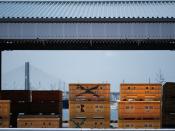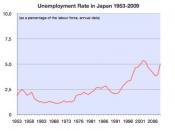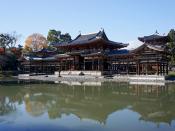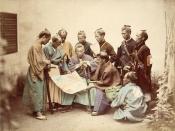Although Japan was technically on the side of the allies during World War One, she had little if any real involvement in the actual warfare. Because she played such a modest role in the war, Japan was able to exploit the economic situation during the war to her advantage. Countries involved in the war had no time to produce domestic goods any more, all their energies were devoted to the war effort, this left a gap in the market which Japan was happy to fill. Not only did Japan begin supplying domestic goods, she also began producing munitions for the allies, which make her economic position during the war even more favourable. Japan export market began to experience a massive boom during the whole war period. This resulted in Japan improving her economic position considerably, this can be seen by Japan becoming a creditor country instead of being a debtor.
Japan benefited greatly form the war, not only did her economic position improve it transformed Japan into a modern economy something she greatly wanted to achieve. The economic effects of the war acted as catalyst for the Japanese economy. Not did her economy boom she was now recognised as a major international power.
The war in itself became a huge market for Japan. Because she spent the majority of the war at peace Japan was able to exploit the huge demands on munitions production that a war requires. Japan's munitions manufacturing grew extensively throughout the war period and Japan supplied the Allied countries with a large percentage of all their munitions requirements during the war. Not only did the Allies place large orders with Japan for munitions, they also required them for other manufactures. Due to the war, many of these countries did not have the time or the resources to produce domestic goods required for their country to carry on as normal. The War placed an increasing strain on their economy for them to provide everything they required so they began to import goods more and more from Japan.
Not only did increased trade come from countries involved in the war, it also came from neutral countries. Countries that used to be supplied from countries involved in the war now needed a new market from which to import their goods. This was because the countries that used to supply them now didn't have the time because of the huge constraints placed upon them by the war. They couldn't even produce enough goods for their own goods so exporting was out of the question. Because of the evaporation of Western competition, Japan was able to take up a huge amount of the economic market once dominated by the Western powers. Japan began exporting goods to countries in Asia, Indian and China.
Due to the increasing economic prospects the War had given the Japanese market they now needed to supply consumer and high technical goods such as machinery, tools and chemicals for themselves. This had always been imported from other countries before 1914. In order to receive as much economic profit as she could, Japan was required to free herself from dependence on other nations for these goods. Not only did she require these goods to export, she also needed them for herself. During the war period a large number of new industries were created in order to meet these new demands placed upon their economy. These industries starting producing heavy goods like electrical and chemicals goods, which were to be exported and used within the Japanese economy. Not only was Japan exporting all their original goods, like cotton goods, textiles and silk they have also moved into a completely new market. For the first time in Japanese history there was a huge export surplus compared to what they were importing. Due to their huge exporting growth Japan was expanding significantly in numerous different markets, consequently their economy was growing at a phenomenal rate. Japanese industries both in the traditional and the modern sector were expanding hugely because of the war.
The ship- building industry boomed throughout the war period, especially Mercantile shipping. Due to the war European shipping firms were forced to divert their mercantile vessels used for transporting all forms of imports and exports from Asian waters to the Mediterranean and the Atlantic. This left the market open to Japan so the Japanese shipbuilding industry expanded to fill the gap. This enabled Japan to export even more cheaply to countries within Asia and China, as it reduced Japan's costs. In 1915 seventy-five per-cent of mercantile vessels were foreign, but by 1918 seventy-five per-cent were Japanese thus demonstrating how quickly they captured the market because of the favourable economic position they were in. During this period Japan had no real competition. As a result of their increased economic development in many different markets, Japan became a creditor nation rather than a debtor. In 1914 before the war began Japan's economy was extremely poor and owed debts to other nations of approximately one hundred million pounds to various nations. By 1920 Japan was in the complete opposition situation she was now a creditor for about the same amount and was even lending money to other nations. 'the gold reserves held in Japan increased from 129 million yen in December 1914 to 228 million yen in December 1916.' This shows just how much Japan benefited from World War one.
Because Japan had very little real involvement in First World War they were able to benefit greatly from the economic situation. As there was no European competition Japan was able to become the dominant exporter for a large majority of countries. Not only was she providing for the neutral countries, she was also able to export to the Allies both munitions and domestic goods. Due to the current international situation Japan was able to expand her goods market and began to manufacture heavy industry and highly technical goods something she hadn't previous been doing. For the first time ever, Japan was exporting more than she was importing, and was also a creditor country rather than a debtor. Japan economic position was drastically improved because of the war. She was able to use this situation to her full advantage, which she did. Japan had transformed the structure of her economy; she could now be described as a modern, industrial state, and a powerful international nation.
BibliographyG. C. Allen, Japan's Economic Policy (London, 1980), p.28.





